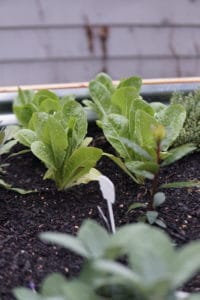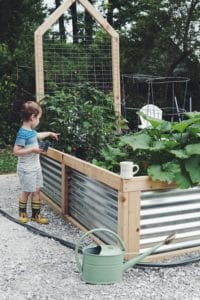Nutrition World > Food >
Many of us have found new hobbies or interests during the quarantine. For us, we built an organic garden at our house.
It kept our hands busy during a time when our minds could have wandered into a state of fear and anxiety. Nevermind the satisfaction of producing something from nothing. It provided a place of beauty and rest where the unrest of the world couldn’t permeate.
Click here to read about more tips on Finding Natural Relief from stress.
How Much Space Do I Need for a Garden?
But I’m not here to talk about what we created. I’m here to talk about the benefits of having an organic garden of your own. While ours turned into more of a mini-farm, raised beds of any sort are a simple way to grow and harvest your produce. Raised beds are great. They need minimal site preparation for the most results. Even if you don’t have the space for large beds like these, many plants can be grown in containers and small pots. The yield that even a few small containers can produce may surprise you!
Our beds are a simple construction of 2×4’s and corrugated steel roofing sheets. We copied a tutorial online that we found, but augmented them to fit our style and size. They’re 8ft x 4ft and are the right size for our space. In the future, our plan is to add a small greenhouse with more beds. One thing to remember when building your beds is to not make them too wide. You want to be able to reach from one side of the bed to the other without too much effort. 4ft wide seems to be a sweet spot.
These beds are also taller than most. We wanted them raised off the ground because of the large creature population in our neighborhood. And, we also didn’t want to go through the trouble of building cages for each bed. But, keep in mind that taller beds mean more dirt to fill each one. We had a tree fall in our backyard and used large portions of that to line the bottom of the bed. This means less fill dirt. Also, the wood will decompose over time and feed nutrients back into the soil. We then topped each bed with about a foot of local compost. It has provided great growth for everything we’ve put in there.
What Should I Plant?
We decided on a mixture of seasonal vegetables for our garden. Herbs like basil and sage, dill, stevia, thyme, oregano, mint (careful, this can take over the world), and chives. Produce includes some of the summer staples. Squash, cucumbers, peppers, and tomatoes. As well as melons, leeks, sweet potatoes (it’ll be a while before these come in), and butternut squash. We also have romaine lettuce, spinach, and spring greens coming in slowly. But we will likely have all lettuce in a separate bed next season to cut and rotate for fresh salads all season long.
If this season has taught us anything, it’s that in a panicked crisis food is one of the first things to go. We’re not full-blown “preppers” by any stretch of the imagination. But we want to take steps to decrease our food supply chain. It’s so satisfying to walk into your own backyard and grab what you need for a delicious lunch or supper. It’s all organically grown from seed to harvest. So you can rest easy knowing that you’re getting the absolute best quality goods you can find. It was grown by your own hands after all.
Why Grow Organic?
There’s no doubt that growing anything is challenging. Growing organic is even more difficult. So why even bother?
Well, because it’s awesome and it’s worth it. You can walk out of your house, pick your fresh veg of choice off the vine or stem, and eat it without hesitation. No herbicides, pesticides, or fungicides are on your plants. And you’re encouraging the building of a robust micro-ecosystem. Organic farming goes beyond our own health and extends into the health of the land we’re taxed to care for.
Organic farming goes beyond our own health and extends into the health of the land we're taxed to care for. Share on XCommercial farming uses toxic chemicals to protect plants. These chemicals have a negative effect on our health. They also strip the soil of its nutrients and imbalance already fragile ecosystems.
Left to its own devices, the earth will find balance. “The Biggest Little Farm” is a great example of that. If you haven’t watched it yet, you should. The stunning footage and lessons this film provided blew us away. The fact that land that is depleted of nutrients can be reborn is amazing. Allow nature to self-correct without the use of harsh chemicals. The results are nutrient-dense, clean, and better-tasting food.
Final Thoughts
Wendell Berry said it best:
Interested in Learning More?
Reach out to us today to see how we can help you achieve optimal health and vitality. Our health coaches are here to help you live your best life.
Schedule a wellness consultation now. We can consult with you online!
We also offer the convenience of online shopping. Products are shipped directly to your home.







